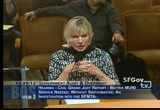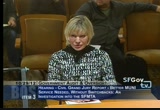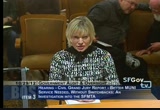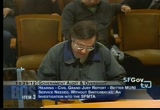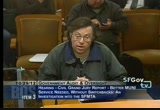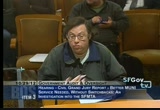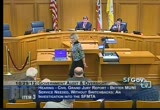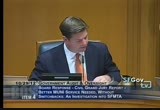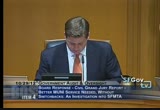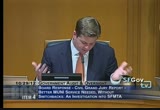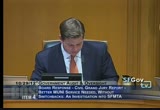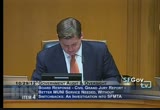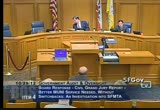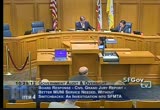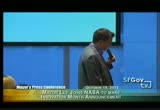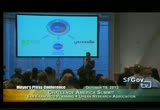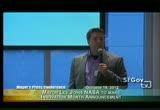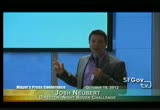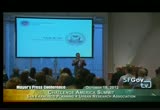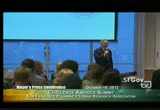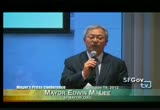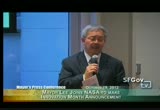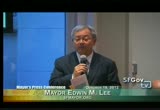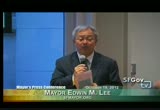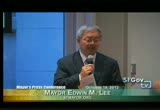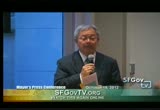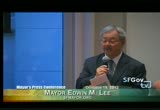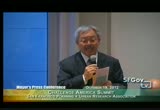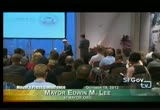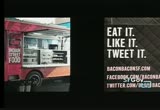tv [untitled] October 30, 2012 1:00pm-1:30pm PDT
1:00 pm
switchbacks we would have to read about and make up our minds whether they were a good or bad idea. in other words, this is not a professional -- they haven't made a professional study of whether these switch backs were advantageiacy to the system in any way, whether they sped up or slowed down the system, or disadvantaged to the passengers. they haven't done any study on the impact to the passengers? . >> okay. thank you and in terms of the different jurisdictions and how they use switchbacks or they don't -- >> here's what we found. mr. hailey says he was in boston until 1995. that was one of the first systems we interviewed. we asked them about switchbacks used as a tool to regulate the system. we're not talking about responding to emergencies. all the systems have a whole switch
1:01 pm
back policy that they use. most of them call it a turn around. i'm not sure why we're kiewlg it a switch back in san francisco, but they have policies for turn arounds. they only use them in an emergency. not to smooth traffic. not when buss and trains are clumping and the person in boston was the one that said his passengers "would never stand for it". i don't know if san francisco passengers are more complacent than boston passengers but he said that and they would never do it. >> okay. did you guys talk to all the other people and their response? there was a list in the jurisdictions and portland and philly -- >> those we didn't talk about -- talk to. we asked repeatedly when talking to muni officials which other systems they would recommend for us to talk to,
1:02 pm
which other systems used it? we ask if were books or manuals or anything they could give us that showed that switchbacks were a best practice tool which they had said. they said they were going to increase using switchbacks because they were such a good tool. we asked them if there was please a manual or something that we could read that described how switchbacks were used as a tool and they said "no". we asked if there is another system we could talk to and they said "no". >> all right. thank you. >> thank you. >> president chiu. with that i appreciate everyone's comments and responses. before we close item one in the hearing and get to the responses i want to open it up to public comment. any members of the public that wish to comment on item three? you may line up on the wall. mr. pillpal.
1:03 pm
>> and i just realized i wore my boston shirt. prior to serving in boston john was the deputy general manager at bart and has worked in other cities as well so his transit management experience is considerable, and i just wanted to note that. i will just add a couple of things. i think john hailey covered many of the points. the one management is overall topic how to keep service on time. switchbacks are a technique in line management. i think the real key issue at mta is actual transit operator staffing and when they have fewer than they need there are problems with filling runs and having to make other adjustments so i think keeping operator availability at a high level, highering and training on a regular schedule
1:04 pm
is critical to running muni effectively. just as antidote last night after the game i was downtown. there was a lot of joy and celebration, but there was also a lot of muni delay that was unanticipated, unanticipatable. i understand that trains were stranded on the embarcadero. that power had to be shut down for safety reasons. there were a lot of services that had to get rerouted. that happens. in a city like this and moves like muni does and the traffic and the incidents that happen line management is a critical thing and switch backs are a regularly used tool. operations, planning, supervision, all have a role to play. as a final example going
1:05 pm
through both of the districts and one california where there is a delay downtown or somewhere in route if all of the vehicles are allowed to proceed out to geary and 33rd at outer terminal there would be more delay and impact in bound for the passengers waiting at california, at fillmore, at other locations and why the system is designed with locations to switch back at fillmore, at presidio, at sixth avenue and that happens when necessary, no more than system, so i'm sorry in this case i think the grand jury didn't get get it. >> thank you very much. any other members of the public wish to comment? seeing none public comment is closed. >> [inaudible] >> i'm sorry. >> exactly what we was referring to we brought that up with the other systems about -- well,
1:06 pm
there are fewer passengeros the out bound than the in bound and every single one of them said they solved that ahead of time by scheduling so they make short runs in the center area where the city has lots of travelers and then they make other longer runs and they make fewer longer runs and short runs and announce it ahead of time and the promise to the passengers is met. thank you. >> thank you very much. any other members of the public wish to speak on this item? seeing none public comment is closed. supervisor chiu can we table item three? all right. next is item four and asked to respond to the findings and recommendations from the grand jury report. i want to them them for their time and effort into
1:07 pm
this, for the mta and their responses. i think from my perspective and the use of switchbacks -- i get it's a management tool. we have to be nimble here in san francisco and i have heard from resident s and the incredible frustration when they don't understand this is happening and the delays and so forth so i think there are competing interests here. i don't think -- i don't agree with the extremeos either side of the debate so to speak, but with that why don't we go through all the items. so for the finding number one and violate the spirit of the san francisco charter. i will say partially agree here. i think it can put both ways. i think reliable you want the majority of people to have reliable muni service here but as well when they're kicked off early or don't see the bus come their way and i hear that and happens in my district and i'm going to say partially
1:08 pm
agree. number two and muni management express little interest in the alternative of switchbacks. i will disagree with that. it's not something they want to do but within the tool and arsenal so i would not say that they express little interest. i think they understand there is push back when these happen. there is no statistical or other evidence that switchbacks aleveiat delate or scheduling? i would agree there. it seems more than any grand jury report we seen lately there is quite a bit of disconnect and i don't ever whether it's cooperation or another issue and i think that is unfortunate and you
1:09 pm
need to comply with the civil grand jury and i am going to agree with finding three. finding four, muni officials show calious disregard with the riders and i am going to disagree with that. i think that is inflammatory and i appreciate where you're going but i don't agree with that language. number six, other systems and passengers and switch backs and other than reasons of emergencies and accidents and whether we agree partial leo disagree partially. i. >> >> say agree partially and there are time when is they don't use them and they listed jurisdictions that according to them use switchbacks so i imagine the answer is in the middle and i suggest we partially agree. number seven
1:10 pm
and the improvements in the system and i will partially agree. i know they work hard at this. they want to do it -- like many of the other city departments is fiscally constrained in their budget and it's something we couldn't see on a day-to-day basis here in city hall and i witnessed here while on the board with budgets getting cut so i suggest that we agree partially there. finding number eight muni's advance control center lack operating personnel and can't communicate with muni drivers. simply agree. nine and muni has failed to publish rider surveys as recommended in the quality review and also agree with finding number ten. as far as the recommendations go. recommendation number one and eliminates switchbacks for equipment break down or accidents or unavoidable accidents. we have no
1:11 pm
jurisdiction over the mta, the board of supervisors recommendation two and learn from systems that don't resort as switchbacks for the solution. my understanding is that will be implemented in the future and the controller's office is engaged in a multi-year effort to improve services and like was mentioned and the tep and the reconstitution of that. number three and determine the funds if additional funds are available and they do that and in selection of contracts and number five and surveys fiscal year 2008 and 2010 quality
1:12 pm
review recommendations. as with recommendation one this is not within our jurisdiction to improve or implent or the board of supervisors. as far as our response goes we will say will not be implemented. this is under the jurisdiction of the mta and not us as the board even though we would like a say in the matter. president chiu those are my find disbltion that is fine. while this isn't an issue that affected by district three constituents as much i have heard the concerns and i want to thank the civil grand jury for looking into these practices and i agree with supervisor farrell and ask that the mta eliminate these practices look to other jurisdictions for best practices and minimize the practice and explicit guidelines when switchbacks might be justified
1:13 pm
but the incredible frustration of passenger who is are put into difficult situations when they experience switchbacks certainly i echo the sentiments to look at this practice and make sure it doesn't happen. >> thanks president chiu and before we approve the resolution i would like to open it up for public comment. any members of the public like to comment? seeing none it is close. president chiu. >> i make a motion to recommend the recommended actions. >> okay. and we can do that without objection. madam clerk are there any further items? >> no there are not. >> no there are not.
1:14 pm
>> so nicely here, and very happy that all of you could come out and join us, you know, on this evening. my namey. the director of the night rover challenge. i'm going to kind of be the moderator for tonight, as we go through this first-ever challenge america summit. so i've got just a few things that, you know, i wanted to do with everyone, before we get into the program. first of all, i just want to take a minute and have everyone just look around this room. in this room, we have amazing people that are corporate, nonprofit, and government, all focused on challenge driven innovation in some way or another. this is a really powerful,interf people that are gathered here to look at how competitions can
1:15 pm
drive innovation. that's what tonight is all about, is, you know, the next step in creating a real wave of innovation. my job tonight is just to give you a little bit of background on what we are, what we're tiqp)q)s that we have.roup of so just to get going with that, i want to tell you a little bit about this thing called the night rover/< challenge. this is a collaboration between the clean tech open, unoodle, and nasa. it's a program from nasa's office of centennial challenges. and it's challengin the best innovators in america to create radical new energy storage technology. you know, way above what we have now. this is something very powerful, to be able to keep rovers going on the moon, in mars, things that could be useful, in your cell electric vehicles, something that just is a radical leap in
1:16 pm
new technology. but i don't want to go into a lot of detail on that. you'll hear more about nasa's efforts later. and what i'm going to do1r is ge a little more background on challenge-driven innovation. and i'm going to do that just by plaijerrizing some people because it makes it a loteasier for me. i want to look at this quote, prize is a very old -- an old idea that is surprisingly powerful in our modern society. this is by a study that by mckenzie and company, back in 2010. prize is a very old idea, very powerful in our modern society. surprisingly powerful in our modern society. mckenzie also said this, 32,000, in 2010, there were 32,000no competitions, competitions, prizes, awards. that's a big number. it could be bigger but it's a big number, for one year, 32,000
1:17 pm
competitions happened. to continue on in myk mckenzie also said this, while tens of thousands of prizes and awards are give out every year, we've been struck by the lack of conferences or professional associations to share best practices and facilitate collaboration. now there's some kind of relationship between what doing here today, and that. i don't know exactly what it is, but hopefully by the end of tonight and tomorrow, we can start j we're doing here, can really start toqphp having an organization, or, you know, somethingd exactly what mckenzie is saying is missing. so this just brings me to myó last question. and it's why are we here. here inca this room. that's just one side of it. i'm not talking about why we're here in som galactic cosmic
1:18 pm
sense of theá@ word. what i'm talking about is a more important part of that question. i am missing a slide in there. so the important part of that question was why are we here in san francisco. and we're here in san francisco because san francisco is one of the most innovative cities in the galaxy, and it's a very great place to be the home of the challenge america summit, the first-ever challenge america summit. so it's now my job to introduce our first speaker of the night, who is going to officially kick off the first-ever challenge america summit, somebody who has been verylfe instrumental in creating a movement around innovation in san francisco. just a few months ago, announced october as innovation month inla
1:19 pm
whole lot of work on, you know, creating a@g real ecosystem for entrepreneurs, for governments, for everybody to create new ideas and new innovations. please join me in welcoming mayor ed lee to the floor. >> [applause.] >> thank you. thank you, josh. welcome, everybody. now that i know where i'm at, i want to welcome all of you, i want to of course thank the night challenge -- night rover challenge, nasa, of course, for being here. i also want to thank s.p.u.r. again for hosting it. you know, when i started working with s.p.u.r. many years ago, i knew they were a spacey people. didn't realize it would ultimately end like this. wanted to thank s.p.u.r. because they really have always been host for so many of our great ideas of how to do better planning in the city. i also want to thank -- i know
1:20 pm
jennifer is here as well -- i told you when i first met you, i love your title, director of prizes? are you kidding? of course she has the longer title, but i thought that when bevan dufty and i were creating the director of hope in san francisco that we thought we had a pretty good title but now i'm going to change over, director of prizes. i may have to adopt that for some of our programs. but that's exciting for you to be here as well. certainly for green tech, open, for their contributions here, because it's really a neat blend, with the efforts that we're doing, both in innovation, as well as being greener and trying to continue earning the greenest city of america title that we earned just this past year. we've been pretty lucky. as i announced this innovation month, there has just been scores of ideas that has come forward about what we could do, how we could celebrate, and how
1:21 pm
we could expose a lot more about what our technology companies are doing here in collaboration with so many others. but i'll begin by saying, first, you know, there are some things happening in our city that are just incredible. you know, i didn't declare myself to be, you know, the tech mayor, even though i've kind of fallen into a lot of that. i actually wanted to be -- and earned the title being the jobs mayor. the jobs for the city has been my number one goal. and we've been doing pretty well. when i first began last year in 2011, unemployment rate here was 9.6. and just a few months ago, we celebrated the milestone that it went down to 7.4. and that's like the third lowest in the state. well, today, we got some even better news. so how about we flip 9.6, a year ago, to 6.9. today, it's 6.9.
1:22 pm
>> [applause.] >> and technology is leading the way. we're home to now -- just within our 49 square miles, we're home to 1,635 technology companies, still growing, over 225 clean tech companies, more than 100 biotech companies, and we have owncone of those categories or growing more every month. imgetting excited because that means a lot more jobs. i think we will soon lead the whole state. and i kind of say that too because marin county has traditionally been lower than ours and so has san mateo. i think marin county has been lower because we have their wine, you will probably have some tonight and san ma taiee because it's our airport that emploaxcju everybody there. so we will take credit for all three counties. i told jerry, i'm never going to
1:23 pm
complain to jerry brown, what he to happen in the state legislature, because i used the first year and a half to insulate myself from all of that, emotionally as well as programmatically to say i'm not going to let the state hurt our city or the federal government. we've got to innovate our way out of this economic dole drum and we are doing so with inviting people here. those of you who take this word challenge, and really can really seriously bring that to fore with your best ideas, this is what i'm doing with all these technology companies. i'm not satisfied with just hosting a new company in the city, i want to know what they're doing, who's working there, where they're coming from, what they plan for the five or 10 years and how we can help them grow. as they're growing their jobs i want to know technologically how we can help. that's why i love going to
1:24 pm
accelerators, to find out what are the next five years that we're incubating so when it comes like what happened last week with dr. yam naka working at gladstone institute at mission bay becomes one of the newest nobel prize winners in medicine working with uc-san francisco and the pharmaceutical companies there, they're on the verge of discovering wonderful stem cell research that will cure a lot of cancers in our lifetime. you're going to see some cures come out of mission bay. we're doing the right thing, we're creating this wonderful, exciting innovative spirit in the city and we're doing it, not just with the companies locating here, with the people that are here, we're asking employees of the company to step up, through our sf city, our tech chamber of commerce, and volunteer their time to improve things that are not working as well as we'd like in the city. we have on-line ability called
1:25 pm
improve sf that allows people to come on line, tackle a lot of the issues that the city faces, allow for some c)eative thinking, people who can't spend a lot of time in meetings with us, that can actually offer their ideas on line, and we take those ideas very seriously. so we've been working on things on like how to make muni faster, how to bring fresh foods to low income poverty areas of the city, and our newest one, just to given you a sense, we wanted everybody to help us develop and design a new library card. talk about civic engagement. 2,000 submissions on line for a new designed library card. that leads me to a challenge that i would like to announce, as part of this night rover challenge, and that is we have been asking ourselves a question, along the lines of energy use in the city, something that has been hard for us to figure out. and that has to do with what would inspire you, as someone who lives in the city, to give
1:26 pm
your data of your own energy use in the city, like your home energy use? all that data about when you use it, what are your hot times, your cool times. how about if we try to find some way to inspire people to give us that]h data, in some coordinated way. because if we understand that 20 to 22% of our emissions comes from1ar residenl use, you can imagine if we had that data coming from every household use in the city we could break that data down with involvement of creative people like yourselves, and then try o see where there's patterns where we could lessen our carbon footprint and talk about better energy use. that's perfect for us. that's what we're going to ask this challenge to present for
1:27 pm
our next improve sf challenge for the city. and that's what we'd like to engage people in. and then hopefully, some time after this challenge is announced, and if we can get the best ideas out there, we will be engaged with you to select the best answer. and if there's an idea out there that can answer that question about how to inspire people, then hopefully wq can go into november a hack-athon sponsored by green biz and others to develop an app that everyone can use. that's a great challenge. that's going to be so worthy of contributing to a goal that we've had about reducing our carbon footprint as a city. it's not just the households. once we get that data out we could look at the data from a community.re level and look at e data from a citywide level to see what we can do. i'm encouraged by that. i didn't want to give my data up to pg&e for various reasons. now iú] want to give it up for this challenge because i know
1:28 pm
people will be creative in having thisçe challenge to be something positive for the city. i wanted to announce that, get that out there with you, and join this wonderful challenge that you have, and think about how we could work together. meanwhile, in between that stuff and in between celebrating the month and doing things we have to write a proposal to win the superbowl in san francisco. thank you very much. thank you. >> [applause.] >> thank you, mayor lee.
1:29 pm
i'm derek, i'm hyungry, and ready to eat. these vendors offer a variety of the streets near you. these mobile restaurants are serving up original, creative and unusual combinations. you can grab something simple like a grilled cheese sandwich or something unique like curry. we areher here in the average eight --
111 Views
IN COLLECTIONS
SFGTV: San Francisco Government Television Television Archive
Television Archive  Television Archive News Search Service
Television Archive News Search Service 
Uploaded by TV Archive on

 Live Music Archive
Live Music Archive Librivox Free Audio
Librivox Free Audio Metropolitan Museum
Metropolitan Museum Cleveland Museum of Art
Cleveland Museum of Art Internet Arcade
Internet Arcade Console Living Room
Console Living Room Books to Borrow
Books to Borrow Open Library
Open Library TV News
TV News Understanding 9/11
Understanding 9/11